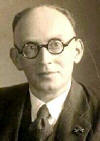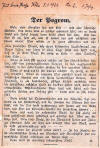JACOB
RAPHAEL: Biographical Notes
By Zeev Raphael,
Haifa
His friends knew him as Jack.
26 August 1897: Born in Posen (today Poznan). Son of Isidor and Dora (nee DRUCKER)..
1914: Jüdisches Lehrerseminar. Köln.
During WWI,
soldier in France.
Completion of studies in Köln:
Literature and History. Teacher at
Juedisches
Waisenhaus,
Köln.
1923 to 1924: Teacher in Geseke, Westfalen.
1924 to 1937: Beckum, Westfalen. Teacher at the Jüdische Volkschule. Also Hazan, and Jewish community leader in general.
Numerous publications in the Jewish press. Since 1924 -
perhaps earlier - he contributed to the Israelit,
Jüdisches Wochenblatt
and others.
1925:
married Lilly FISCHER of Fürth. Their son
Heinz (Zeev) was born in 1927.
Between 1926 and 1936 he was active in the "neutral" Jewish
Youth Movement (Jugendverein,
Düsseldorf), and on behalf of Zionism.
In an article in Der Israelit under the heading "Das
Judenland wartet auf die Heimkehr zum Judentum" (“The Land of the Jews is
awaiting the Return to Judaism”) he wrote (20 July 1933) ”... Die Proklamation
der jüdischen Heimkehr und Rückkehr wird über den ihr
einst zugedachten engen Rahmen einer
Parteigruppierung hinauswachsen
und zum Kampfruf einer geeinten, bewusst jüdischen Front werden. Diese Front muss kommen, weil es sich
um eine letzte grosse Hoffnung und um die Verantwortung der jüdischen Zukunft gegenüber handelt." (“The call for a Jewish return and
homecoming will grow beyond the early idea of a narrow framework of a political
alignment, into the battle-cry of a united and conscious Jewish front. This front will surely materialize, because
it is our last great chance, and our responsibility towards the future of the
Jews.”)
1937: Israelitische Gartenbauschule Ahlem. Senior Teacher.
1938 to 1939: Zwickau, Sachsen. Prediger and teacher. Four
weeks in KZ Buchenwald, following the November 1938 Pogromnacht.
June 1939: emigration
to England. Kitchener Camp, Kent (Hut #33). He joined the
British Army in December 1939,
among the first, when this became possible for "enemy aliens". Pioneer Corps, and later Royal Army Pay
Corps. Demobilized
1945. In 1946
he became a British citizen. 1946-56 with Machinery Lloyd, Leicester and later, London. Manager of subscription
department. He lived in Ruislip, Middlesex.
Aliya October 1956, joins son Zeev and his family in Israel. He settled with his wife in
Ramat Gan.
Correspondent for several
British industrial journals. To
the Petroleum Press Service and the Mining Journal, he
contributed almost until the last day of his life.
While in Israel, he was known for his articles, book reviews and
stories, among others to readers of Hakidmah, Mitteilungsblatt, Die Stimme,
Das Neue Israel and AJR
Information.
During his last years, he devoted much of his time to Heinrich Heine
research. He had eight papers published
on various themes of the poet's works and relatives, - in the Zeitschrift für die Geschichte der Juden, the Bulletin of
the Leo Baeck Institute, and in the Heine Jahrbuch of the Düsseldorf Heinrich-Heine-Gesellschaft.
Jack Raphael died on 8 June 1971 in his 74th year.
A friend wrote of him: “… Not many people are privileged to retain so much spirit and interest and creative activity right up to the end of their lives – as he surely did…”
The Pogrom
Jacob Raphael, Jüdische Freie Presse Köln, 5 January 1921. Vol. 1, No. 2
Translated by Zeev Raphael, July 2007
The song is endless, and its melody is eerie. The heart grieves on hearing its distant wail roaring through the misty night. The song is old, very old, but it is always new, and upsets ever again. One wishes to put an end to it, like to a bad dream, or a bird of ill omen. One longs and hopes that the song will disappear forever – without reverberation, and without an echo…
If only we could get some quiet on the snow-covered moors, on the scorching-hot plains, in the tormented villages, in the feverish lanes and in the wretched huts. –
If only we could get some quiet! Oh yes, certainly, it will be quiet. When the hidden fury will be unleashed, together with lunacy its treacherous companion, and it will trek through the narrow village lanes, and will sound its deafening and poisonous laughter. Then there will be deathly quiet! An invisible but powerful hand will pull the strings, when a savage and coldly calculating eye will provoke and agitate and give the signal to start – then it will be quiet, deathly quiet!
Smoke will arise from the wreckage. The infant will lie crushed at the breast of its mother, and the bones of the men will be in ashes. Silence and poverty will hang over the graveyards. And the blue skies will illuminate the silence of death…
And then the mysterious power that had been feeding so ravenously on the spilled blood, will relax at last. But only for a brief moment. Because the power that has forged the chains and shackles for humanity, is founded on clay and requires blood and marrow in order not to collapse. - - -
And when will the Pogrom end? - It will end when through tireless struggle for truth and justice, that demonic power will be smashed and at our feet. –
Then you will arise, you suffering world!

